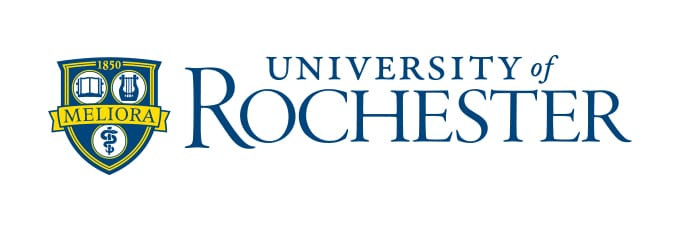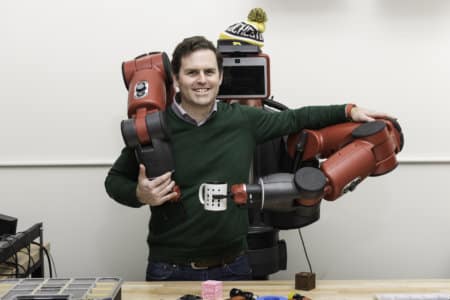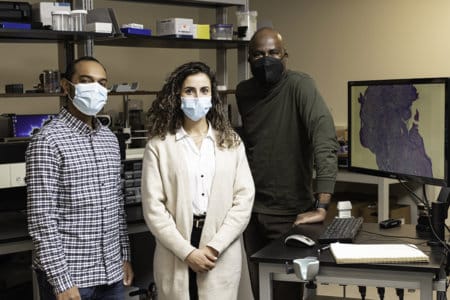University of Rochester’s Department of Electrical and Computer Engineering (ECE) graduates thrive. They’re making their mark at large and small companies, across a diverse range of sectors. These include Bose, Google, Apple, IBM, Siemen’s, GM, Microsoft, Intel, Verizon, Amazon, and the US Government. The more academically inclined take up faculty or research positions in industry or beyond.
Many credit a large part of their success to their graduate degrees. Specifically, to their alma mater’s award-winning faculty members. Through unwavering support and renowned expertise, professors and staff here have helped many students evolve into emerging leaders in areas such as Robotics, Signal Processing, Ultrasound Imaging, Image Processing, Circuits and Computer Systems, Nanoscale Electronics and Photonics, Medical Imaging, and Quantum Engineering.
It’s an outcome befitting of ECE, part of Hajim School of Engineering & Applied Sciences, which ranks among the top 50 engineering schools in the country according to the US News and World Report best graduate schools ranking. More impressive still are the unique journeys of each ECE student in their pursuit of personal and professional goals. Here’s a selection of stories by students on their unique and self-driven ECE education.

Abrar Faiyaz finds the university’s cutting-edge facilities invaluable to his PhD. Source: University of Rochester
Abrar Faiyaz
PhD candidate Abrar Faiyaz from Bangladesh first became interested in electrical and computer engineering in high school. During a workshop on robotics, he discovered more than just the underlying mathematical and scientific principles of engineering — but discovered a fascination with the way that engineers could use their knowledge to create devices, algorithms and solutions that could solve real-world problems.
At the University of Rochester, he’s doing just that. His research interests lie in the intersection of medical imaging, machine learning, and tissue mechanics. “I am developing new methods for using machine learning to analyse medical images and, in specific, the goal is to reduce the gap between clinical and research MR sequences with data engineering. My goal is to develop new tools that can be used to improve the clinical diagnosis and treatment of diseases.”
His advisor Dr. Marvin Doyley “has significantly enriched” his research. This allows Faiyaz to make the most of his time here, especially at its cutting-edge facilities. “The university has some state-of-the-art labs and equipment that have been invaluable for my research. For example, the Centre for Integrated Research Computing’s BlueHive has a powerful computer cluster that I can use to train my machine learning models and use for parallel computing.”
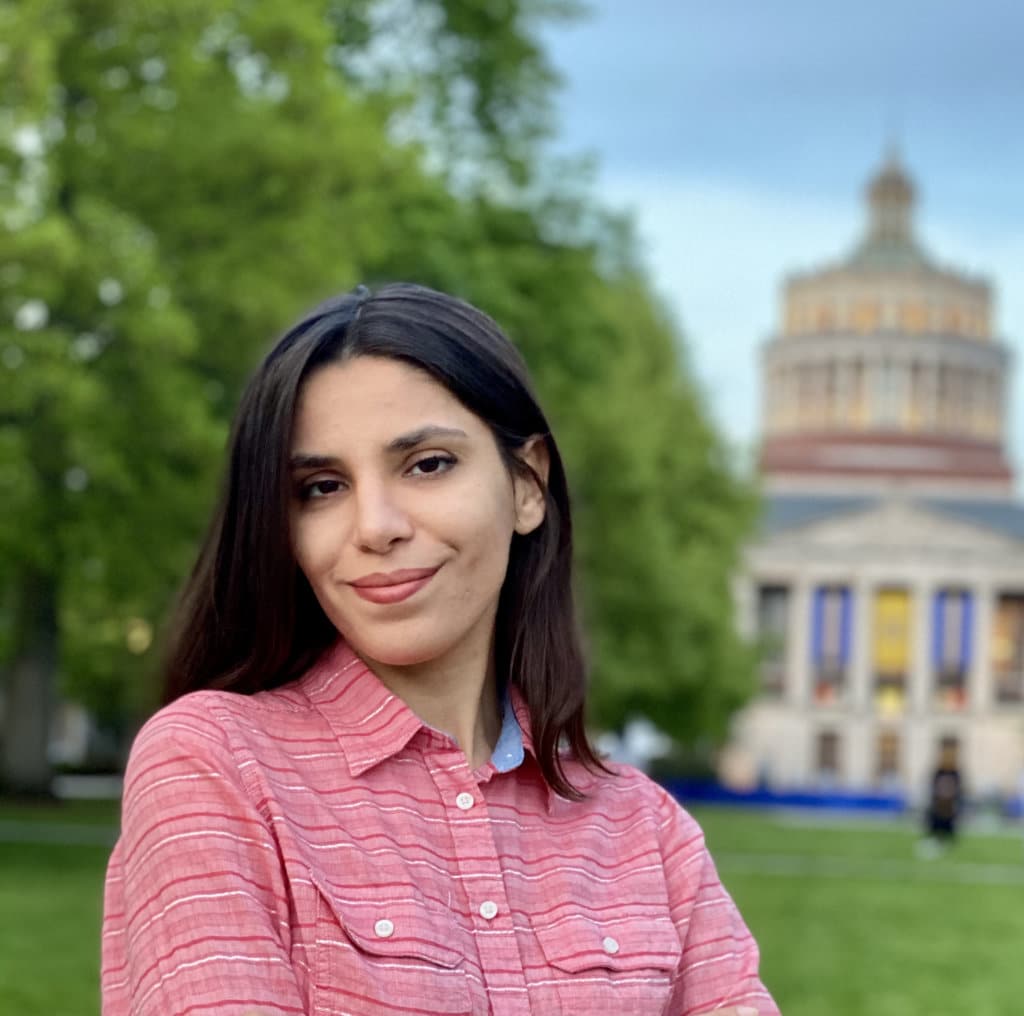
PhD student Narges Mohammadi from Iran is developing AR/VR solutions for blind people navigation. Source: University of Rochester
Narges Mohammadi
Renowned dynamic research programmes. Welcoming academic community. Hands-on research experience. Close interaction between faculty and students. These were the reasons why fifth-year PhD student Narges Mohammadi from Iran chose the University of Rochester. “The opportunity to work closely with renowned researchers and the emphasis on interdisciplinary collaboration made it clear that this programme was the perfect fit for my academic and research goals,” she says.
Mohammadi is working on a project entitled “Developing AR/VR solutions for blind people navigation” which aims to give a sense of awareness and synthetic vision for blind people through visual-to-audio rendering. Given the magnitude of this project, having the best facilities is crucial. “The Medical Imaging lab was pivotal for my research, offering advanced ultrasound imaging for precise experiments and data collection,” she says. “The Studio X lab was also invaluable for my AR/VR work, particularly in creating navigation applications for the visually impaired.”
Mohammadi believes her PhD has enhanced her analytical thinking, making her a detail-oriented researcher who excels in a hands-on, fast-paced work environment. She aims to drive cutting-edge AI progress in visual computing and make significant contributions to healthcare and technology.
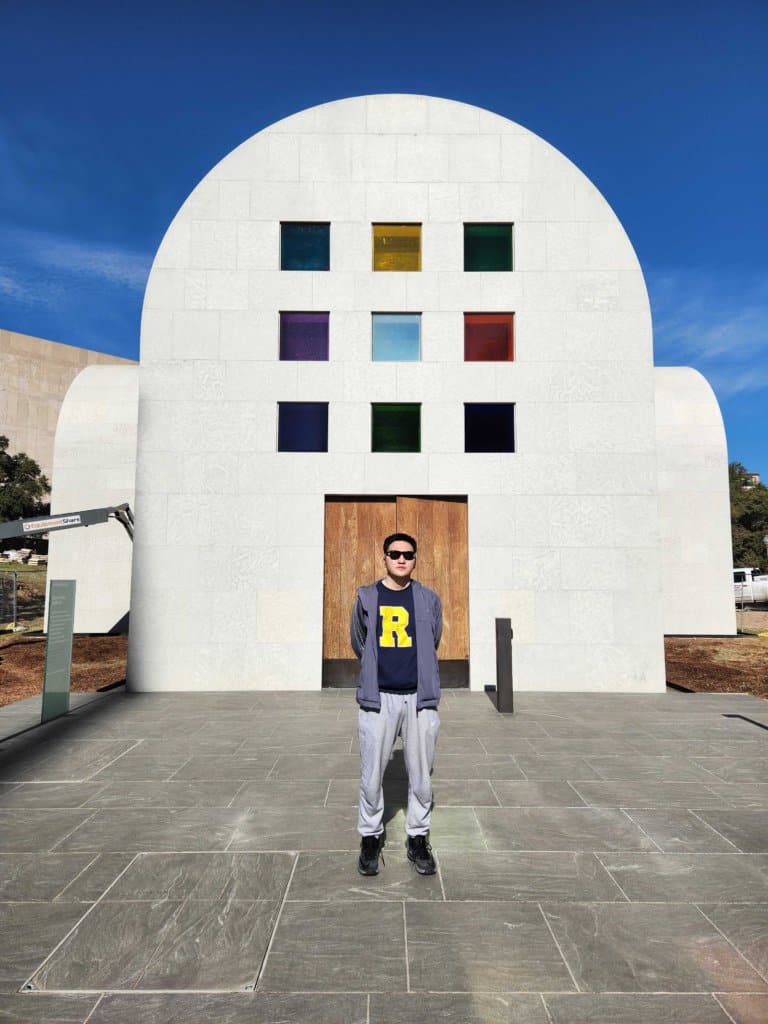
Wentao Hu’s research focuses on functional ultrasound imaging for measuring physiological parameters, specifically brain vascularity, using ultrasound. Source: University of Rochester
Wentao Hu
For Wentao Hu, having a small class size is important as it enables better interaction and mentoring. At the University of Rochester, he found precisely that. His largest class has only 40 students. “It gave me better communication with professors and lecturers,” he says.
Hu’s current research focuses on functional ultrasound imaging for measuring physiological parameters, specifically brain vascularity, using ultrasound. He believes he can make a breakthrough if he can get two aspects of his research tick. To achieve that, he finds the Digital Image Processing, Ultrasound Imaging, and Detection and Estimation Theory classes relevant to his research.
His advisor and study coordinator always go above and beyond. “My advisor, Dr. Marvin Doyley, is a renowned scientist and a role model in my graduate studies. He always offers guidance when I am stuck in research,” Hu says. “Ms Michele Foster, my graduate study coordinator, helped me with paperwork, communication, and departmental matters.”
After graduating, Hu intends to focus on medical devices and image processing, leveraging the extensive experience and knowledge he has acquired during his time in graduate school. Most importantly, he is confident that he can achieve his goals — something that every student at the University of Rochester develops by the time they graduate.
Yifei Jin
After graduating from Chongqing University, China, Yifei Jin decided to pursue her master’s programme abroad, and that’s when she came across the University of Rochester. “The innovative curriculum, distinguished faculty in machine learning, and inclusive community aligned with my interests,” she says.
Today, she is pursuing a Master’s degree in Electrical Engineering, exploring the hardware aspect of computers and seeking a comprehensive understanding of computer organisation and its functions. She realised she was in the correct environment when she discovered that the faculty members went out of their way to provide support in her learning journey.
“The professors here are exceptional; they display patience and expertise in their respective fields,” she says. “For example, when I faced challenges in a project, Prof. Tong Geng provided extensive assistance and encouragement, leading to my success with an A grade in his course.”
Follow University of Rochester on Facebook, X, Youtube, Instagram, and LinkedIn.






